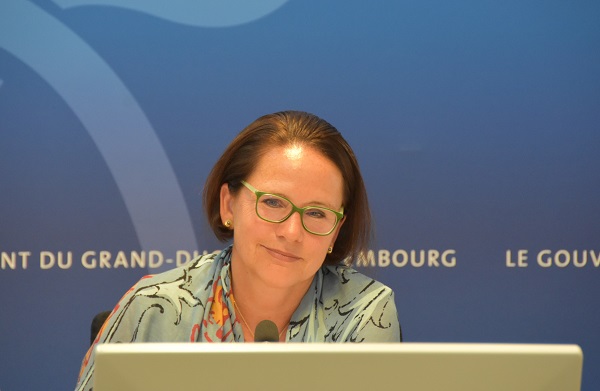 Yuriko Backes, Luxembourg's Minister of Finance;
Credit: MFIN
Yuriko Backes, Luxembourg's Minister of Finance;
Credit: MFIN
On Monday 18 July 2022, Luxembourg's Minister of Finance, Yuriko Backes, presented the financial situation of the State as of 30 June 2022 during a joint meeting between the Finance and Budget Committee and the Budget Execution Control Committee of the Chamber of Deputies (parliament).
Minister Backes commented on this occasion: "The financial situation of the State at the end of the first half of this year is less serious than one might have feared a few months ago, with revenues showing some progress, globally stable expenditure and a balance that currently remains positive. This result halfway through 2022 inspires me with confidence in the resilience of our public finances, but it needs to be qualified in two respects: revenue is growing much less rapidly than in 2021 and significant expenditure is expected in the coming months, and this in a less buoyant economic context, marked by significant inflationary pressures".
Revenues collected by tax administrations amounted to a total of €10.3 billion as of 30 June 2022, i.e. an increase of 10.3% compared to the previous year, and represented 53.7% of revenue of the approved budget. Despite this positive development, revenue is increasing more slowly than last year: on 30 June 2021, the increase was 24.4% and revenue collected at the time represented 56.4% of the approved budget. Total government revenues amounted to €12.2 billion as of 30 June 2022.
Regarding the breakdown of tax revenue, the aforementioned increase is mainly explained by the tax withheld on wages and salaries (retenue d'impôt sur les traitements et salaires - RTS) whose revenue increased by €445 million or 18.1%, due in particular to a labour market momentum and the cumulative effect of the two wage indexations in October 2021 and April 2022. This positive trend is expected to be greatly reduced during the second half of the year following the entry into force of the energy tax credit (Crédit d'Impôt Énergie - CIE) from 1 July 2022, significantly reducing tax receipts under the RTS.
As for indirect taxes, revenue from value added tax (VAT) rose by €206 million or 9.1% year-on-year. Despite the strong price variation, the increase in revenue due to VAT is near the values observed historically. Revenues from excise duties on fuel (petrol and diesel) remained broadly stable compared to the previous year. At the same time, the downward trend in diesel sales continued, with the quantities sold until 30 June 2022 experiencing a drop of 3.3% in annual comparison. Compared to 2019, a reduction of 24.9% was observed, which, according to Luxembourg's Ministry of Finance, confirms the effectiveness of the CO2 tax, introduced from 2021 to gradually reduce the environmental footprint linked to fuel sales.
Government expenditure amounted to €11.1 billion as of 30 June 2022, a slight increase of 1.9% or €203 million. This relative stability of expenditure in annual comparison is explained in particular by the gradual dissipation of expenditure related to COVID-19 aid. Excluding the latter, public investments evolved at the same level as in 2021 to reach about €1.2 billion during the first half of 2022. Expenditure on intermediate consumption, i.e. operating costs of the State, increased by €66 million (up 8.1%) and remuneration expenses increased by €245 million (up 9.8%).
The upward trend in total expenses is expected to increase in the coming months due to several factors. Like receipts, the delay in certain payments risks somewhat distorting the picture observed at 30 June and their expected execution during the second half of the year will increase the rise in expenditure. In addition, the inflationary pressures on prices, the implementation of the measures decided in the context of the "Solidaritéitspak" and "Energiedësch" measures and certain aids still in place in the context of COVID-19, as well as the execution of investments planned for the rest of the year, will put continued pressure on spending in the months to come.
Positive revenue development coupled with broadly stable expenditure is currently leading to a surplus position at the end of the first half of the year 2022, with the balance amounting to €1.1 billion according to Securities and Exchange Commission (SEC) rules (+€209.1 million according to national accounts rules). However, due to the deterioration of the macroeconomic environment in the context of the war in Ukraine, international organisations have had to revise growth forecasts downwards and uncertainties remain very high at present. Together with the cost of government measures and a number of technical factors listed above, a considerable deterioration in the government balance is thus expected in the coming months. An updated estimate of the annual deficit will be presented on the occasion of the State's draft budget for 2023, which will be presented to the Chamber of Deputies on 12 October 2022.
Minister Backes concluded: "Given the still tense and volatile global situation, the continuous deterioration of the international situation, high inflation and the uncertain geopolitical context constitute major challenges for our public finances. In view of these elements, we can expect a deterioration in the State's financial situation in the months to come. While caution and rigor therefore remain in order, I am nonetheless delighted that the current development is less serious than expected on the occasion of the 2022 Stability and Growth Programme, which allows us to envisage reductions of the tax burden of those who need it the most, in line with my commitment made during the debate in the Chamber of Deputies on 14 July. In any case, I will continue to ensure responsible and far-sighted management of our public finances, especially in view of the preparation of the draft budget for 2023".








